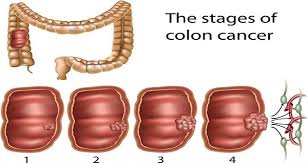
What is Colon Cancer?
Colon Cancer is a disease where cancer cells are formed in the colon or rectum. Also known as rectal cancer or bowel cancer, this disease spreads in the parts of large intestine with the potential to reach to other parts of the body as well.
There are many causes of colon cancer, and some prominent ones include inherited genetic disorders, old age, smoking, use of alcohol, family history etc. Unlike other forms of cancer, genetic disorders are not a major factor, and not going beyond a tiny percentage of the total number.
Survival rates are good for the cancers that are restricted to the colon wall; however, the rates are dismal when the disease has reached other parts of the body. Men are more prone to this form of cancer than women.

What are the types of Colon Cancer?
There are different types of colon cancer. Let’s have a look at them:-
Adenocarcinomas – The most common form which originates in the gland cells of the bowel wall Squamous cell cancers – A rare type that begins in the bowel lining Carcinoid tumours – A rare type that develops in the hormone producing tissues Sarcomas – A type that originates in the smooth muscle Lymphomas – A cancer of the lymphatic system

Sign and symptoms of Colon Cancer
In colon cancer, signs and symptoms rely on the nature, location and intensity of the tunour. There are some symptoms that accompany the disease, like:-
• Constantly deteriorating constipation • Blood in the stool • A decline of the stool thickness • Loss of appetite • Weight loss issues • Rectal bleeding • Anemia • Nausea • Vomiting • Bowl habit changes

Treatment of Colon Cancer
Surgery is often recommended as the first treatment in cases where colon cancer has not spread to different parts of the body. Six-month adjuvant chemotherapy is also the norm. Similarly, surgery alone is sufficient to cure the Stage 0 cancer.
In most of Stage I cases, surgery works fine where no additional treatment is needed. In the Stage II, the surgery performed would take out on the section of the colon along with the lymph nodes.

